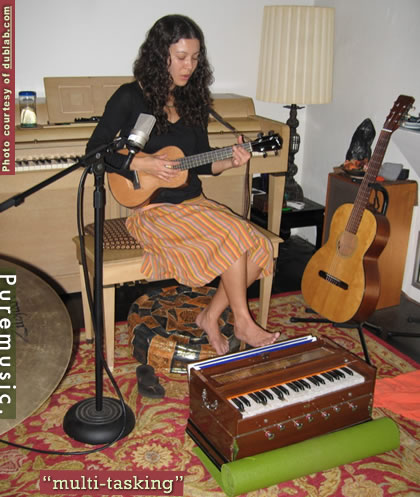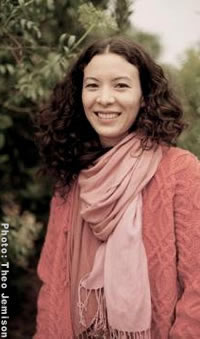
A Conversation with Mia Doi Todd (continued)
PM: I think the song "Esperar es caro"--"Waiting Is Dear"--has a very enchanting lyric that I'm glad you reprinted inside the CD in English. Where did you come across the poem by Armando Suarez-Cobian, and where is he from?
MDT: Armando is Cuban. He is a poet. He left Cuba and moved to New York seeking greater artistic freedom about 10 years ago, where I met him. We're good friends. He likes my music, and is a big supporter of mine. We always wanted to work on a song together. So he sent me a big stack of poems years ago with the hope that I would find one that I could make into a song. I had this whole guitar song working, and I had a vocal melody and rhythm that I liked. But I couldn't think of any English words that would express this song. And I felt like it should be in Spanish. And then I remembered these poems. I went through them. And "Esperar es caro" immediately revealed itself to be the song. It immediately fell into the rhythm and melody that I had been singing for this guitar part. I barely had to change anything. I repeat some words that are not repeated in the original poem. But it's basically the poem, word-for-word. And it ties into a lot of the themes on the rest of the album, about experiencing longing and being in the moment. So it was meant to be. We are friends. He's been working on the new Benicio del Toro movie about Che Guevara. He helped with the Spanish in that movie, so he's been doing well. He's still writing.
PM: What is the new Benicio del Toro movie?
MDT: It's about Che Guevara, I don't know what it will be called. There will be two of them.
PM: Oh, that'll be fantastic, him playing Che.
MDT: Oh yeah. So Armando worked side by side with Benicio on the Spanish for that movie.
That reminds me, we were going to describe the making of "River of Life." So let me return to that for a moment. I made the guitar part, without lyrics--I went on this meditation retreat, because I had kind of run out of things to say. I felt like I was almost going mute at one point, a few years ago. And I went on a meditation retreat, and I had a very cleansing time. And I came back, and all these words just started pouring out of me. I finished writing a song, I wrote a bunch of other songs, and three months later I was ready to record. So Andres and I, who have been playing at my house in my living room, we went for two days and recorded demos of these songs, and then with the thought, with Carlos Nino, that we would record an album. So we got the studio for another ten days. The record was recorded in 12 days, which is pretty quick, though not in the old school where it would be recorded in one day. But in today's terms that's quite short. And we actually used a lot of the demos that Andres and I recorded, because it captured the essence of the song.
PM: It's hard to beat the demo sometimes.
MDT: Yes. We recorded them without headphones in one room, but the congas and me playing guitar and singing simultaneously.
PM: So there's lots of bleed.
MDT: Lots of bleed, yes. And it's a little hissy--"River of Life" includes a lot of room noise, or just room sound. It's not that we were going for that, but that's what we got. And it just captured the spirit of the song. And I just went straight into the "Yes Song" and the 10-minute epic, yes.
PM: I mean, it's so unusual in today's recording world that someone will lay down something like that. I thought, wow, what a unique artist. She's really something.
MDT: Thanks.
PM: Speaking of that meditation retreat that kind of created a song burst there, would you talk a little about the spiritual side of your life--which seems to be very prominent in the very fabric of the recording of Gea.
MDT: Yes. I'm definitely a seeker in this life, trying to figure out the nature of life. And music is such a gift, and really just an ancient expression of humankind, like the relationship to nature, and being human, and making beautiful things--it's a spiritual quest. And music, it's amazing to make this invisible thing, it's like a bridge to the spiritual life which is also a kind of invisible thing.
Music, you can make it by yourself, but it's also a beautiful thing to make music with other people-when you do that, and you're making a thing outside of yourself that's invisible, you can feel a spiritual relationship between yourself and some greater thing, and feel like a part of it. And songs--it feels like they are already written in some perfect way, and you're trying to hear them, and they whisper in your ear, and then you are just a medium to bring them out into the world.
This album was a lot about self-expression and individuality, everybody having their own slice of life, but being part of some--it's hard to talk about spiritual things--some good way--art is a good way to express some spiritual feeling or idea, and it's hard to put into words.
PM: Yeah, words fall a little short, generally. But music is a good medium.
MDT: Yes.
PM: How about books? Are you much of a book reader, and if so, have you read anything lately that turned you on in one way or another?
MDT: I go through periods of reading all I can of certain authors. Right before I wrote some of the songs for Gea I was really into Hemingway, his diction and conciseness kind of led me in some of the writing for the song "Sleepless Nights." I love D. H. Lawrence. I finished all the books by a lot of the authors I like. So I'm really looking for new authors to latch onto--especially because I'm going on this tour, and I need to read a lot. Lucille Clifton is a poet that I like very much. My friend gave it to me. And I always go back to Sufi writing, Rumi and Hafiz.
PM: Absolutely.
MDT: They are probably the best, or at least my favorite.
PM: It's amazing how the words of Rumi and Hafiz still ring true so many centuries later.
MDT: Yeah, they are so contemporary. I only read them in translation. I wish I could speak Arabic and read it. But not today. Maybe not this life. [laughs]
PM: Do you speak Spanish, though? Your Spanish sounds very good when you sing it.
MDT: I grew up in L.A., so Spanish was always spoken around me. I'm not a fluent Spanish speaker. I studied French in school and Japanese, so I'm stronger in both of those languages than in Spanish. But I love Spanish, and do study it.
PM: Would you like to say anything about the upcoming election, or the war in Iraq, or anything on the political side.
MDT: Well, it would be good for everyone to vote. Not enough people go out and exercise their American right to vote and express their views. There's a lot of apathy in America that is bringing us down. I don't believe in war, not in any way. I believe in self-defense, yes. But we have been very aggressive in the world, with so much ignorance. We do not know how to rule other people. We do not know how to rule ourselves. We have such a young country. How could we think we should have our way?
PM: Yeah.
MDT: My idea about self-expression also applies to countries. I think countries should have their right to express and guide themselves rather than being guided by another or feel like they have to fall into this homogenous world of consumerism--Americanism is pretty much capitalism, consumerism. And these things are not saving the planet. These things are really harming the world, and jeopardizing all life on the earth, doing environmental damage. So I think we need to love each other, not incriminate and hate each other.
PM: I agree. Well, Mia, we applaud the artistic singularity of your vision, and are very glad you're out there. And I'm very grateful that you spent some time with us today to share some of who you are. We really like your music a lot.
MDT: Thank you so much. Hope to meet you in Nashville sometime, and to play there.
![]()
|
listen to clips |
| print interview (pdf) | |
| miadoitodd.com | |
| her myspace | |
| theo jemison (theophoto.com) | |
| thanks to: | |
| dublab.com (do visit them) | |
| Howard Wuelfing | |
| puremusic home |
![]()
